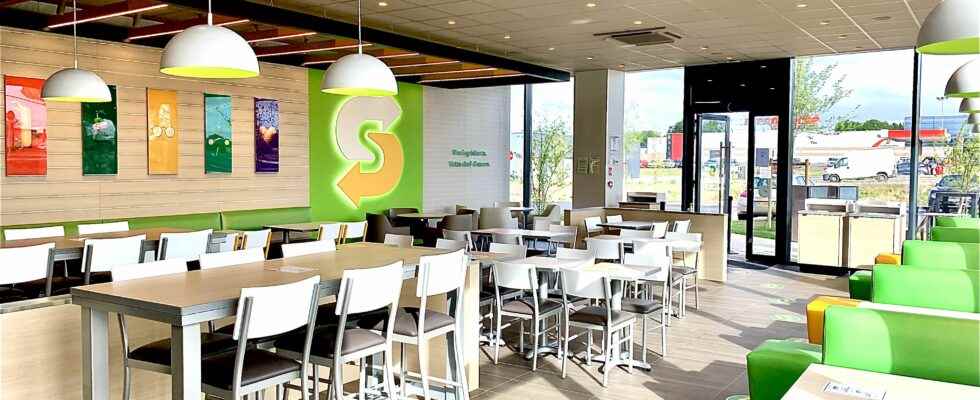A few days ago, these boxes still ended up in the trash. But, since January 1, 2023, cones of fries, boxes of burgers or cups for soda are no longer visible in McDonalds. The law relating to the fight against waste and the circular economy (Agec) passed in 2020 requires fast food establishments with more than 20 covers in seats to use reusable tableware for meals and drinks served at the table.
Fast food chains serve 6 billion meals per year in 30,000 points of sale in France, which generates 180,000 tonnes of waste each year. For large chains like McDonald’s or KFC, which use disposable packaging and tableware in profusion, it is a question of changing the model. Smaller channels also have to adapt to the new legislation. This is the case of Subway, whose particularity is to have 400 restaurants in France managed 100% by independent franchisees, as underlined in an interview with L’Express Sandra Chassan, general manager of Subway France, Belgium and Luxembourg.
L’Express: How has Subway prepared to be ready to comply with the legislation in force on January 1?
Sandra Chassan: We had already implemented sorting in our restaurants and since 2017 we have initiated a waste reduction policy. We have also set up tests in around ten restaurants in 2022. We were therefore able to be ready on January 1 in order to be able to provide customers with reusable containers such as cups, plates, salad bowls and stainless steel cutlery.
About 95% of our reusable tableware are cups used for the consumption of cold drinks. In addition, the paper that surrounds the sandwich is not affected by the law, in other words our flagship product is not. In addition, more than 80% of our establishments already have dishwashers: we therefore have the capacity to clean reusable dishes without calling on an external company.
Only 85% of our fleet is affected by the legislation, 15% of our establishments therefore having less than 20 seats. Some restaurants that are not affected by the law, managed by multi-franchisees, have already or will set up reusable tableware. On the other hand, the monofranchisee having a small restaurant with 4 seats for example, which can do 95% of take-out sales, will always continue to be disposable.
In the end, the application of this law poses fewer difficulties for us due to the size of our restaurants and the low volume of waste to be processed compared to other colleagues and competitors. In addition, our brand has always been geared towards take-out sales – I include delivery – which can represent up to 90% of sales in certain restaurants. We therefore did not need to hire additional staff to absorb the workload associated with this new legislation.
How did you proceed to educate your franchisees, but also your customers in the dining room?
We have put in place tools available to franchisees and we have informed them so that they can properly deal with this new legislation. We have accompanied this approach by communicating with customers, reminding them of the new actions to adopt so that they know how to sort or dispose of leftover food.
If a reinstatement does not respect the game, it will be subject to the penalties provided by law. We have made it clear to our employees that compliance with the law is not optional but mandatory. As our establishments are 100% managed by independent franchisees, we do not have the means to intervene with franchisees in order to force them to comply with the law.
What are the concrete difficulties encountered by some of your establishments?
The potential work to be carried out in certain brands may pose some difficulties for our franchisees and, in general, for fast food players. For Subway, the challenges lie mostly in operational changes. There are now two containers: the reusable one and the single-use one. When ordering, employees will also ask customers more clearly if the consumption is on the spot or to take away.
In addition, our franchisees are afraid of having a fairly high rate of loss, both with contents thrown in garbage cans and with the theft of reusable tableware. During the test phase, these thefts could represent up to 40% of the dishes in some restaurants. We have already anticipated these risks of theft in our orders.
This law represents a change of model: it complicates our way of operating. It represents a fundamental change in the way we work, even if the impact is not as significant for Subway as for other fast food companies.
These changes can be confusing at first but at the same time I am confident because like any change, it will take time. Customers will gradually get used to being served in reusable crockery, they are already used to it when they eat at home or when they eat in traditional restaurants so I don’t think there are many brakes on their part.
This Friday, January 6, you are meeting the Minister for Ecological Transition and Territorial Cohesion, Christophe Béchu, as well as the Secretary of State for Ecology, Bérangère Couillard, to present your action plan… What do you expect from your trade with them?
It will be interesting to share our feedback and discuss the constraints that our establishments are facing. It is necessary to have a more collaborative work upstream. It’s about thinking about how to work over the long term with an entire ecosystem in order to have a positive impact on the environment. It will be important to move forward collectively during the next laws that will be put in place, in particular the reduction of plastic. The progressive evolutions are complicated to manage, laws appear every two years. The major changes that we want should be worked on in a more globalized way and not in jolts.
